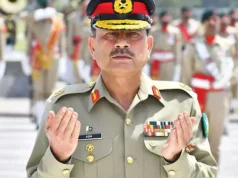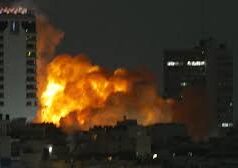Pakistani Prime Minister Shehbaz Sharif has called an urgent meeting of the National Command Authority (NCA), the country’s apex body responsible for overseeing its nuclear arsenal, as tensions with neighboring India reach a critical point. The announcement, made early Saturday, follows a series of military engagements between the two nuclear-armed nations, raising global concerns about the potential for further escalation.

According to state broadcaster PTV and military officials, the NCA meeting is set to discuss Pakistan’s strategic response to recent Indian missile and drone strikes, which Pakistan claims targeted its air bases and civilian infrastructure. The Pakistani military has reported launching retaliatory strikes under Operation Bunyan-un-Marsoos, targeting Indian military sites, including airbases and a missile storage facility. The operation was described as a response to Indian attacks that killed dozens in Pakistan and Pakistan-administered Kashmir earlier this week.
The NCA, chaired by the Prime Minister and comprising top civilian and military leaders, holds the authority to make decisions regarding the deployment and use of Pakistan’s nuclear weapons. The convening of this meeting has sparked alarm, with analysts interpreting it as a signal of heightened readiness amid the ongoing conflict. “This is a significant escalation,” said a security expert based in Islamabad, speaking on condition of anonymity. “The NCA meeting underscores the gravity of the situation and Pakistan’s intent to keep all options on the table.”
The current hostilities trace back to a deadly attack in India-administered Kashmir on April 22, which killed 26 people, mostly tourists. India accused Pakistan of orchestrating the attack, a charge Islamabad denies. Since then, both nations have engaged in tit-for-tat strikes, with India claiming to have targeted “terrorist infrastructure” and Pakistan alleging civilian casualties from Indian aggression. On Saturday, Pakistan reported neutralizing Indian military targets, while India claimed to have repelled Pakistani drone and missile attacks.
International leaders have urged restraint, with the Group of Seven (G7) calling for direct dialogue between the two nations. U.S. Secretary of State Marco Rubio held separate talks with Pakistani and Indian officials, pressing for de-escalation. However, posts on X reflect public anxiety, with some users describing the NCA meeting as “insane escalation” and others accusing Pakistan of “sabre-rattling” to draw global attention.
Former Pakistani Prime Minister Nawaz Sharif, brother of Shehbaz Sharif, has reportedly advised a diplomatic approach to defuse the crisis, according to local media. Meanwhile, Pakistan’s Deputy Prime Minister and Foreign Minister Ishaq Dar emphasized that the country has exercised “maximum restraint” to preserve regional peace.
As the NCA meeting unfolds, the international community watches closely, aware that any miscalculation between these nuclear powers could have catastrophic consequences. Both nations have been urged to prioritize dialogue to prevent further loss of life and avert a broader conflict.






